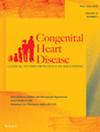Emotions, Perceptions and Health Behaviors of Adult Congenital Heart Disease Patients during COVID-19 in New York City
IF 1.2
4区 医学
Q4 CARDIAC & CARDIOVASCULAR SYSTEMS
引用次数: 0
Abstract
Background: Adults with congenital heart disease (ACHD) have increased prevalence of mood and anxiety dis-orders. There are limited data regarding the influence of the COVID-19 pandemic on the mental health and health behaviors of these patients. Objective: The purpose is to evaluate the perceptions, emotions, and health behaviors of ACHD patients during the COVID-19 pandemic. Methods: In this cross-sectional study of ACHD patients, we administered surveys evaluating self-reported emotions, perceptions and health behaviors. Logistic regressions were performed to determine the adjusted odds of displaying each perception, emotion and health behavior based on predictor variables. Results: Ninety-seven patients (mean age 38.3 years, 46.4% female, 85.6% moderate or complex lesion) completed the survey. The majority of patients reported feeling moderately or very sad (63.1%), and 48.4% of patients identified themselves as feeling moderately or very anxious. The majority of patients perceived their risk of COVID-19 as moderate or high. Females were more likely to report feeling sad and anxious (95% CI 1.06–10.96, p-value 0.039, and 95% CI 1.44–15.30, p-value = 0.012, respectively), and were associated with higher odds of having a perceived increased risk of COVID-19 (95% CI 1.33–10.59, p-value 0.012). There was no association between ACHD anatomic or physiologic classification and perceptions, emotions and health behaviors. Conclusions: Females were more likely to report feeling sad, anxious and an increased risk of COVID-19 in comparison to males. These findings indicate the need for mental health support and promotion of health behaviors during the pandemic amongst all ACHD patients, regardless of underlying condition. © 2022, Tech Science Press. All rights reserved.纽约市成人先天性心脏病患者在COVID-19期间的情绪、感知和健康行为
背景:患有先天性心脏病(ACHD)的成人情绪和焦虑障碍的患病率增加。COVID-19大流行对这些患者心理健康和健康行为的影响数据有限。目的:了解新冠肺炎大流行期间ACHD患者的认知、情绪和健康行为。方法:在ACHD患者的横断面研究中,我们进行了问卷调查,评估自我报告的情绪、感知和健康行为。根据预测变量进行逻辑回归,以确定显示每种感知、情绪和健康行为的调整几率。结果:97例患者完成调查,平均年龄38.3岁,女性46.4%,中度或复杂病变85.6%。大多数患者报告感到中度或非常悲伤(63.1%),48.4%的患者认为自己感到中度或非常焦虑。大多数患者认为他们感染COVID-19的风险为中等或高。女性更有可能报告感到悲伤和焦虑(95% CI 1.06-10.96, p值0.039,95% CI 1.44-15.30, p值= 0.012),并且与认为COVID-19风险增加的几率更高相关(95% CI 1.33-10.59, p值0.012)。ACHD的解剖或生理分类与认知、情绪和健康行为之间没有关联。结论:与男性相比,女性更有可能感到悲伤、焦虑,感染COVID-19的风险也更高。这些发现表明,在大流行期间,无论潜在疾病如何,所有ACHD患者都需要心理健康支持和促进健康行为。©2022,科技科学出版社。版权所有。
本文章由计算机程序翻译,如有差异,请以英文原文为准。
求助全文
约1分钟内获得全文
求助全文
来源期刊

Congenital Heart Disease
CARDIAC & CARDIOVASCULAR SYSTEMS-
CiteScore
0.40
自引率
33.30%
发文量
37
审稿时长
6-12 weeks
期刊介绍:
Congenital Heart Disease is an open-access journal focusing on congenital heart disease in children and adults. Though the number of infants born with heart disease each year is relatively small (approximately 1% of the population), advances in treating such malformations have led to increased life spans for this population. Consequently, today most patients treated for congenital heart disease are over the age of 20. What are the special needs of adults with congenital heart disease? What are the latest developments in the care of the fetus, infants, and children? Who should treat these patients? How should they be treated?
Congenital Heart Disease focuses on these questions and more. Conceived as a forum for the most up-to-date information on congenital heart disease, the journal is led by Editor-in-Chief Vladimiro L. Vida, MD, Ph.D., Professor in Cardiac Surgery, University of Padua in Italy, as well as an international editorial board. Congenital Heart Disease publishes articles on heart disease as it relates to the following areas:
• Basic research of congenital heart disease
• Clinical pediatric and adult cardiology
• Cardiac imaging
• Preventive cardiology
• Diagnostic and interventional cardiac catheterization
• Electrophysiology
• Surgery
• Long-term follow-up, particularly as it relates to older children and adult congenital heart disease
• Exercise and exercise physiology in the congenital patient
• Post-op and critical care
• Common disorders such as syncope, chest pain, murmurs, as well as acquired disorders such as Kawasaki syndrome
The journal includes clinical studies, invited editorials, state-of-the-art reviews, case reports, articles focusing on the history and development of congenital heart disease, and CME material. Occasional issues focus on special topics.
Readership: Congenital Heart Disease was created for pediatric cardiologists; adult cardiologists who care for patients with congenital heart disease; pediatric and pediatric cardiology nurses; surgeons; radiologists; anesthesiologists; critical care physicians and nurses; and adult support staff involved in the care of patients with congenital heart disease.
 求助内容:
求助内容: 应助结果提醒方式:
应助结果提醒方式:


